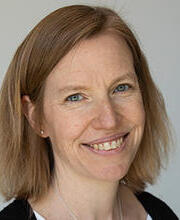Amy Wagers, Ph.D.
Senior Investigator, Islet Cell and Regenerative Biology, Joslin Diabetes Center

Amy Wagers seeks to change the way we repair our tissues after an injury. Her research focuses on defining the factors and mechanisms that regulate the migration, expansion, and regenerative potential of adult blood-forming and muscle-forming stem cells.
Stem cells are rare and unique cells capable of generating many different types of cells needed in the body. In adult tissues, different organs contain different stem cell populations, each of which produces a subset of the body's cells. For example, hematopoietic (blood-forming) stem cells generate all of the red and white blood cells needed to deliver oxygen to body tissues, fight infection, and stop bleeding. Similarly, myogenic (muscle-forming) stem cells generate mature muscle fibers necessary for controlled contraction of skeletal muscle.
Work in the Wagers Lab focuses on understanding the mechanisms that regulate the function of these blood-forming and muscle-forming stem cells so that their potential can be optimally exploited for the treatment of diseases such as cancer, anemia, muscular dystrophy, and diabetes.
Blood-forming stem cells in adult humans produce billions of red and white cells each day and are critical components of bone marrow transplantation procedures used in the treatment of some cancers and blood cell deficiencies. For patients undergoing bone marrow transplant, the success of this procedure requires (1) collection of sufficient numbers of stem cells for transplant, (2) efficient migration of these cells after transplant to their proper locations within the bone marrow, and (3) proliferation of these cells in the body to rapidly reproduce mature red and white blood cells.
Inefficiency at any of these steps can limit patient access to transplant or result in transplant failure. Thus, a major goal of our research has been to identify mechanisms that control the migration and expansion of blood-forming stem cells. Our work suggests that both intrinsic and extrinsic factors cooperate to determine stem cell fate, and we have recently identified particular gene regulators that appear to coordinate stem cell migration and expansion. This new knowledge suggests novel approaches to modulate stem cell activity and ultimately may lead to more effective strategies for bone marrow transplantation.
Muscle-forming stem cells. Muscular dystrophy (MD) is a debilitating and currently incurable disease that arises from mutations that cause dysfunction of skeletal muscle fibers and thus progressive muscle weakness. Because muscle-forming stem cells could in theory enable replacement of mutant muscle fibers with normal, healthy fibers, the development of strategies to isolate muscle stem cells and efficiently transplant these cells into patients offers hope to treat this and other muscle degenerative diseases.
We isolated a unique population of cells from adult mouse skeletal muscle that we have shown has muscle stem cell properties. In cell culture, these cells form large colonies of differentiating muscle cells, which fuse to produce spontaneously contracting skeletal myotubes, and when transferred into the muscle of injured or diseased mice (which model features of human MD), they generate many new muscle fibers. Thus, these cells represent a system for better understanding adult muscle formation and may provide a feasible approach to stimulating therapeutic muscle repair.
Biosketch
Amy Wagers is the Forst Family Professor of Stem Cell and Regenerative Biology at Harvard University, Senior Investigator in the Section on Islet Cell and Regenerative Biology at the Joslin Diabetes Center, Co-chair of the department of Stem Cell and Regenerative Biology at Harvard, an HHMI Early Career Scientist, and a member of the Paul F. Glenn Laboratories for the Biological Mechanisms of Aging at Harvard Medical School. Dr. Wagers received her PhD in Immunology and Microbial Pathogenesis from Northwestern University, and completed postdoctoral training in stem cell biology at Stanford University.
Wagers’s research seeks to understand how changes in stem cell activity impact tissue homeostasis and repair throughout life. Work from her lab provides evidence for the existence of a conserved systemic regulatory axis that modulates tissue maintenance and regeneration across a wide variety of tissues that vary significantly in their intrinsic repair capacity, and her ongoing studies have begun to identify the molecules responsible for age-variant regulation of regenerative potential. Dr. Wagers has authored more than 100 primary research and review articles, and her work has been recognized by awards from the Burroughs Wellcome Fund, Beckman Foundation, WM Keck Foundation, and Glenn Foundation, and National Institutes of Health. In 2013, she received the New York Stem Cell Foundation’s Robertson Prize for outstanding achievement in translational stem cell research.
